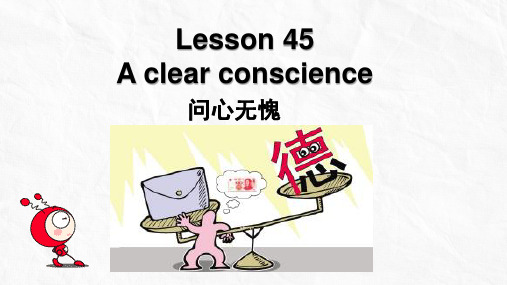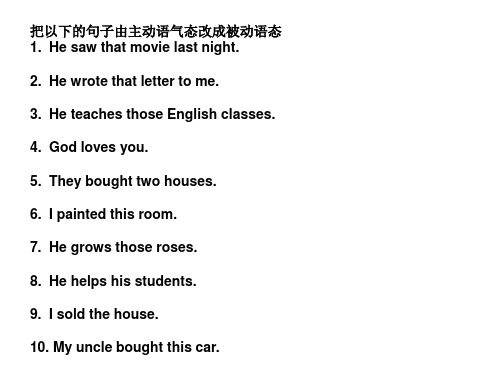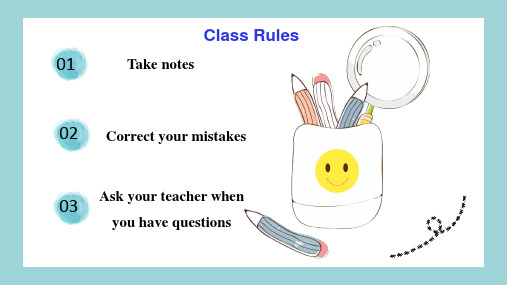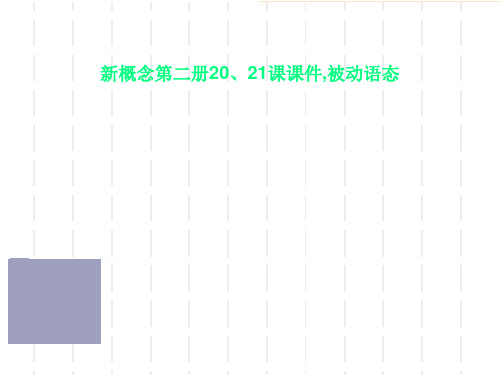新概念二被动语态 PPT
合集下载
Lesson62Afterthefire(课件)新概念英语第二册(2)

When the fire had at last been put out, the forest authorities ordered several tons of a special type of grass-seed which would grow quickly.
在大火最后被扑灭后, 森林管理当局订购了好 几吨一种生长迅速的特殊类型的草籽.
They drank a large /great /small quantity of beer last night. quantity复数时表示“大量”:
He bought books in (large) quantities. quantities of大量的…… quality n. 质量 sth. with good quality具有好质量的东西
Now, smoke still rose up from the warm ground over the desolate hills.
而现在, 发热的地面上仍然升腾着烟雾, 弥漫在荒凉的山丘上. rise up (from)升上来 smoke n. 烟(雾) full of smoke充满烟雾 smokey adj. 多烟的(名词加-y, 变为形容词) smoker n. 抽烟的人 heavy smoker烟瘾重的人; non smoker不抽烟的人 smoke v. 吸烟
in place of替代,取代 (只能指代位置、空间,原来 放的东西现在不在了)
In place of a cup , I put a vase there.
以前放的是茶杯,现在放的是花瓶。
Jane answered the phone in place of Mary.
新概念英语第二册课件Lesson20(共29页)

be excited about 对..感到兴奋 ... is exciting .... 令人感到兴奋的.. I was excited about Growl. This trip is very exciting, so I have a great time.
【Key structures】关键句型
• spend+时间+在某地 在某地度过……时间 • I spent a whole day in the room, but I
didn’t write a single word.
• after <conj.>+从句 在……之后 • After <prep.>+ doing 在…..之后 • After I went to school, I learned a lot of
★realize v. 意识到
• ① v. 认识,知道,明白,意识到 • I went into the wrong room without
realizing it. • ② v. 实现(希望、目标、愿望等) • realize one's dream 实现某人的梦想 • ③ 使变为事实,使发生(常用于被动语态) • This plan can never be realized.
• I was worried about my brother for he caught a serious cold.
• Instead of catching fish, they catch old boots and rubbish.
• instead of… 而不是… 可以放于句首或句尾 • I went to school instead of staying at home. • She bought a book for me instead of buying a dress.
【Key structures】关键句型
• spend+时间+在某地 在某地度过……时间 • I spent a whole day in the room, but I
didn’t write a single word.
• after <conj.>+从句 在……之后 • After <prep.>+ doing 在…..之后 • After I went to school, I learned a lot of
★realize v. 意识到
• ① v. 认识,知道,明白,意识到 • I went into the wrong room without
realizing it. • ② v. 实现(希望、目标、愿望等) • realize one's dream 实现某人的梦想 • ③ 使变为事实,使发生(常用于被动语态) • This plan can never be realized.
• I was worried about my brother for he caught a serious cold.
• Instead of catching fish, they catch old boots and rubbish.
• instead of… 而不是… 可以放于句首或句尾 • I went to school instead of staying at home. • She bought a book for me instead of buying a dress.
新概念英语第二册34课PPT课件

接受。
3. In the letter he was asked to call at the station.
call at: (对某地)拜访 He calls at every house in the street once a month.
call on :探望(某人);号召 你最近去看过乔治吗? Have you called on George recently? 校长号召学生们更努力地学习。 The headmaster called on the students to work harder.
call out :大声叫喊 Some people on the bank called out to the man in
the boat.
call sb. up: 打电话给某人 她将在明天给你打电话。 She'll call you up tomorrow.
call off: 取消 天开始下雨,所以我们取消了比赛。 It began to rain so we called off the match.
9. He was amused too, because he never expected the bicycle to be found.
amuse vt. 娱乐;消遣;使发笑;使愉快
大家听了关于那只狗的故事都笑起来了。
Everyone was amused at/by the story about the dog.
1. Dan Robinson has been worried all week. be worried about=worry about worry & worry about
Tony is worried about his students. Tony worries about his students. Tony worries his students.
3. In the letter he was asked to call at the station.
call at: (对某地)拜访 He calls at every house in the street once a month.
call on :探望(某人);号召 你最近去看过乔治吗? Have you called on George recently? 校长号召学生们更努力地学习。 The headmaster called on the students to work harder.
call out :大声叫喊 Some people on the bank called out to the man in
the boat.
call sb. up: 打电话给某人 她将在明天给你打电话。 She'll call you up tomorrow.
call off: 取消 天开始下雨,所以我们取消了比赛。 It began to rain so we called off the match.
9. He was amused too, because he never expected the bicycle to be found.
amuse vt. 娱乐;消遣;使发笑;使愉快
大家听了关于那只狗的故事都笑起来了。
Everyone was amused at/by the story about the dog.
1. Dan Robinson has been worried all week. be worried about=worry about worry & worry about
Tony is worried about his students. Tony worries about his students. Tony worries his students.
新概念英语第二册第45课课件

Key points analysis
1.The whole village soon learnt that a large sum of money had been lost. 主从复合句,that引导宾语从句。 (1)village在这里为总称,指“村民”,the whole village指“全村的人”,后面通常跟单数 动词(有时也可视为复数)
Part two: New words
[klɪər] [ˈkɒnʃəns] [ˈwɒlɪt] [ˈseɪvɪŋz] [ˈvɪlɪdʒər] [pə'sent]
clear 无罪的,不亏心的 conscience 良心,道德心 wallet 皮夹,钱夹 savings 存款 villager 村民 per cent 百分之...
他一边打扫房间一边听音乐。 He listened to music while须用从句: 我打扫房间时,他在听音乐 He listened to music while I was cleaning the room.
4.Sam was sure that the wallet must have been found by one of the villagers…
Part five: grammar
被动语态 被动语态的基本形式为助动词be + 及
物动词的过去分词,即be done。被动 语态的不同时态是通过助动词be的时态 变化来体现的,其人称和数方面应与主 语保持一致。在初中阶段要求掌握八种 时态的被动语态和含有情态动词的被动 语态,其具体变化为:
一般现在时:am/is/are done 一般过去时:was/were done 现在完成时:have /has been done 过去完成时:had been done 现在进行时:am/is/are being
新概念英语第二册课件Lesson20(共36页)-2

注:动名词作主语与不定式作主语的区别:
动名词作主语通常表示抽象的或泛指的动作,一般不与特定的 动作执行者联系在一起;不定式作主语通常表示具体的动作或行为, 往往与特定的动作执行者联系在一起,如:
realize one's hope/dream/plan He realized his dream at last. →His dream was realized at last. come true 成为现实 (物作主语,无被动语态)
What’s your hobby?
answer the questions
★ boot n. 靴子
a pair of boots running shoes 跑鞋 tennis shoes 网球鞋 leather shoes 皮鞋 sandles 凉鞋 sneakers 轻便运动鞋 (Am.) slipper 拖鞋
★ waste vt./n. 浪费
waste 1) vt.浪费
work. 14.A lot of men have given up _w__e_ar_i_n_g__(wear) hats. 15.She is very interested in _d_a_n_c_in_g__ (dance). 16.On _e_n_te_r_i_n_g (enter) the room, he turned on the light.
This story is less interesting than that one. not so/as ...as 不及,不如 I am not so happy as before. This story is not so interesting as that one.
新概念英语第二册Lesson10被动语态含答案.ppt

把以下的句子由被动语态改成主动语态 1. The policeman was seen by me. 2. Those two books were written by me. 3. These sentences were corrected by my teacher. 4. He was hit by a car. 5. His door was locked by me. 6. His house was built by my father. 7. His boat was given to me by my father. 8. This bird is rarely seen by people here. 9. He is liked by every one. 10. They were given ten dollars by their friends.
把以下的句子由主动语气态改成被动语态 1. He saw that movie last night. 2. He wrote that letter to me. 3. He teaches those English classes. 4. God loves you. 5. They bought two houses. 6. I painted this room. 7. He grows those roses. 8. He helps his students. 9. I sold the house. 10. My uncle bought this car.
11. This picture was taken by him. 12. Too much wine was drunk by tt by Mr. Wang. 14. He was helped by his father. 15. They were served by that waiter. 16. His food was prepared by my mother. 17. His toy was made by my sister. 18. The book was returned to me by Jim. 19. That song was written by my brother. 20. I was invited by him to a party.
新概念英语第二册 Lesson 10(共20张PPT)

try try
tdooidnogRsesttchhe.n努 尝tly力 试it做做w某某as事事damaged
by
a
visitor.
She tried to play jazz on it! She struck the keys too hard and two of
the strings were broken. My father was shocked.Now we are not
A.be looking after B. look after
C. be looked after
4. I wasn't at home yesterday. I B to help with the harvest on
the farm.
A. asked B. was asked C. was asking D. had asked
It was made in Germany in 1681. Our clavichord is kept in the
be mlaivdienginr+o地om点. It has belonged to our familykekfoeerpepado–loiknneggpsttitmh– e一k.e直pt做保某持事 “由某地制T造he”in(s见tr难um点enPt5w0)as bought beylomnyggtora属nd于father many years ago.
Key Words
★ touch v. 触摸 get in touch with 保持联系 eg:请与你的老师保持联系 Please get in touch with your teacher.
Listen to the tape
新概念第二册20、21课课件,被动语态

各种时态的被动语态构成
一般现在时: S+am/is /are +P.P(过去分词)
一般过去时: S+was/were +P.P. 情态动词: S+ can/may/must/should + be+
P.P.
一般将来时: S+ will+be+ P.P. 现在进行时: S+ am/is/are + being + P.P. 现在完成时: S+ have/has + been+ P.P. 过去进行时: S+ was/were+being+ P.P.
1.What are aeroplanes doing to the writer? 2. Where does he live? 3. What can be heard night and day? 4. When was the airport built? 5. Does he know why it wasn’t used then? 6. When did it come into use? 7. How many people must have been
Fishing is good for our health. Fishing is boring. Fishing is a waste of time if you can’t catch anything. …
1.Fishing is my favourite sport. 2. I often fish for hours without catching
Twenty more keys have been made by us. 现在完成时: S+ have/has + been+过去分词
- 1、下载文档前请自行甄别文档内容的完整性,平台不提供额外的编辑、内容补充、找答案等附加服务。
- 2、"仅部分预览"的文档,不可在线预览部分如存在完整性等问题,可反馈申请退款(可完整预览的文档不适用该条件!)。
- 3、如文档侵犯您的权益,请联系客服反馈,我们会尽快为您处理(人工客服工作时间:9:00-18:30)。
5.I told my mother someone had stolen my purse.
I told my mother my purse had been stolen by someone.
6.I told them we would learn Lesson Two today.
I told them Lesson Two would be learned by us today.
4.They ordered me a ticket. I was ordered a ticket by them. A ticket was ordered for me by them. 5.The landlord found me the bag. I was found the bag by the landlord. The bag was found for me by the landlord. 6.I offered him a cigarette. He was offered a cigarette by me. A cigarette was offered to him by me.
Exercises
1.He made us a cake last week. We were made a cake last week by him. A cake was made for us last week by him. 2.My father passed me the ball. I was passed the ball by my father. The ball was passed to me by father. 3.She did me a favor. I was done a favor by her. A favor was done for me by her.
4. I am drinking milk now. Milk is being drunk by me now.
5. I have drunk milk. Milk has been drunk by me.
6. I was drinking milk at that time yesterday. Milk was being drunk by me at that time yesterday.
C: 含双宾动词的被动语态 被动语态:双宾动词+ sb + sth
双宾动词+ sth to sb/for sb 带for的双宾动词有: make/do/find/buy/order e.g. He sent me a card yesterday.
I was sent a card by him yesterday. A card was sent to me by him yesterday.
3. 一般将来时:
主动语态
主语+ will + V原 (主+shall/be going to + V原)
被动语态
主语+ be + p.p (主+ shall be/ be going to be + p.p)
I will clean my room this afternoon. My room will be cleaned by me this afternoon.
D: 含宾语从句的被动语态,通常把从句 部分变为被动语态
e.g. I told you he could do it. I told you it could be done by him.
Exercises
1.I said he would type the letter soon. I said the letter would be typed by him soon. 2.I know the mechanic would repair my car. I know my car would be repaired by the
5.You can’t play football at the street. Football can't be played at the street by you. 6.Someone must type these letters. These letters must be typed by someone. 7.Someone must clean the road. The road must be cleaned by someone. 8.Someone must speak English. English must be spoken by someone.
7. I had drunk milk before lunch. Milk had been drunk by me before lunch.
B: 含情态动词的被动语态 (can, may, must)
主动语态:
主+情态动词+V原形 He can sing songs. 被动语态:
主+ 情态动词+ be + p.p Songs can be sung by him.
He reads books every day. Books are read by him every day.
2. 一般过去时:
主动语态
主语+ V-ed
被动语态
主语+ was/were + p.p
I swept the floor yesterday. The floor was swept by me yesterday.
主动语态: 主语是动作的发出者
I drink milk every day.
被动语态: 主语是动作的承受者
Milk is drunk by me every day.
A: 掌握各种时态的被动语态L141-144
1. 一般现在时:
主动语态
主语+ V原形/V三单
被动语态
主语+ am/is/ are + p.p
mechanic. 3.He says they must finish work. He says work must be finished by them.
4.She said they have made the bed.
She said the bed has been made by them.
4. 现在进行时: 主动语态
主语+ am/is /are + V-ing
被动语态 主语 + am/is/are + being + Vp.p
I am reading the book. The book is being read by me.
5. 现在完成时: 主动语态
主语+ have/has + Vp.p
被动语态
主语+ have been/ has been + Vp.p
I have finished my homework. My homework has been finished by me.
大家应该也有点累了,稍作休息
大家有疑问的,可以询问和交流
6. 过去进行时: 主动语态 主语+ was/were + V-ing 被动语态 主语+ was/were + being + Vp.p
Exercise
1.We must finish work on time. Work must be finished on time by us. 2.They must take care of the children. The children must be taken care of by them. 3.The boy can ride a bike. A bike can be ridden by the boy. 4.She can climb trees. Trees can be climbed by her.
He was reading books at six yesterday. Books were being read by him at six yesterday.
7. 过去完成时: 主动语态 主语+ had+ Vp.p 被动语态 主语+ had been + Vp.p
He had finished his work. His work had been finished by him.
Exercises
1. I drink milk every day. Milk is drunk by me every day. 2. I drank milk yesterday. Milk was drunk by me yesterday. 3. I will drink milk soon. Milk will be drunk by me soon.
I told my mother my purse had been stolen by someone.
6.I told them we would learn Lesson Two today.
I told them Lesson Two would be learned by us today.
4.They ordered me a ticket. I was ordered a ticket by them. A ticket was ordered for me by them. 5.The landlord found me the bag. I was found the bag by the landlord. The bag was found for me by the landlord. 6.I offered him a cigarette. He was offered a cigarette by me. A cigarette was offered to him by me.
Exercises
1.He made us a cake last week. We were made a cake last week by him. A cake was made for us last week by him. 2.My father passed me the ball. I was passed the ball by my father. The ball was passed to me by father. 3.She did me a favor. I was done a favor by her. A favor was done for me by her.
4. I am drinking milk now. Milk is being drunk by me now.
5. I have drunk milk. Milk has been drunk by me.
6. I was drinking milk at that time yesterday. Milk was being drunk by me at that time yesterday.
C: 含双宾动词的被动语态 被动语态:双宾动词+ sb + sth
双宾动词+ sth to sb/for sb 带for的双宾动词有: make/do/find/buy/order e.g. He sent me a card yesterday.
I was sent a card by him yesterday. A card was sent to me by him yesterday.
3. 一般将来时:
主动语态
主语+ will + V原 (主+shall/be going to + V原)
被动语态
主语+ be + p.p (主+ shall be/ be going to be + p.p)
I will clean my room this afternoon. My room will be cleaned by me this afternoon.
D: 含宾语从句的被动语态,通常把从句 部分变为被动语态
e.g. I told you he could do it. I told you it could be done by him.
Exercises
1.I said he would type the letter soon. I said the letter would be typed by him soon. 2.I know the mechanic would repair my car. I know my car would be repaired by the
5.You can’t play football at the street. Football can't be played at the street by you. 6.Someone must type these letters. These letters must be typed by someone. 7.Someone must clean the road. The road must be cleaned by someone. 8.Someone must speak English. English must be spoken by someone.
7. I had drunk milk before lunch. Milk had been drunk by me before lunch.
B: 含情态动词的被动语态 (can, may, must)
主动语态:
主+情态动词+V原形 He can sing songs. 被动语态:
主+ 情态动词+ be + p.p Songs can be sung by him.
He reads books every day. Books are read by him every day.
2. 一般过去时:
主动语态
主语+ V-ed
被动语态
主语+ was/were + p.p
I swept the floor yesterday. The floor was swept by me yesterday.
主动语态: 主语是动作的发出者
I drink milk every day.
被动语态: 主语是动作的承受者
Milk is drunk by me every day.
A: 掌握各种时态的被动语态L141-144
1. 一般现在时:
主动语态
主语+ V原形/V三单
被动语态
主语+ am/is/ are + p.p
mechanic. 3.He says they must finish work. He says work must be finished by them.
4.She said they have made the bed.
She said the bed has been made by them.
4. 现在进行时: 主动语态
主语+ am/is /are + V-ing
被动语态 主语 + am/is/are + being + Vp.p
I am reading the book. The book is being read by me.
5. 现在完成时: 主动语态
主语+ have/has + Vp.p
被动语态
主语+ have been/ has been + Vp.p
I have finished my homework. My homework has been finished by me.
大家应该也有点累了,稍作休息
大家有疑问的,可以询问和交流
6. 过去进行时: 主动语态 主语+ was/were + V-ing 被动语态 主语+ was/were + being + Vp.p
Exercise
1.We must finish work on time. Work must be finished on time by us. 2.They must take care of the children. The children must be taken care of by them. 3.The boy can ride a bike. A bike can be ridden by the boy. 4.She can climb trees. Trees can be climbed by her.
He was reading books at six yesterday. Books were being read by him at six yesterday.
7. 过去完成时: 主动语态 主语+ had+ Vp.p 被动语态 主语+ had been + Vp.p
He had finished his work. His work had been finished by him.
Exercises
1. I drink milk every day. Milk is drunk by me every day. 2. I drank milk yesterday. Milk was drunk by me yesterday. 3. I will drink milk soon. Milk will be drunk by me soon.
